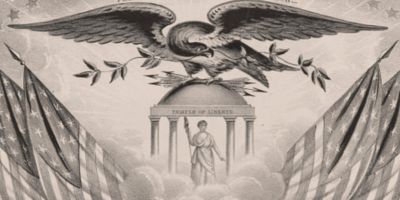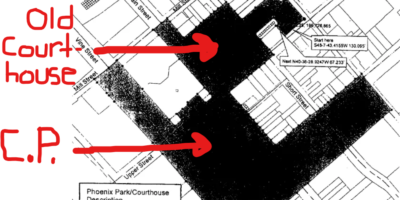By Joy Arnold
Just as we are marveling at the inability of Congress to protect the environment and provide reforms in health care, financial structures, and election law, a recent Supreme Court ruling has affirmed our suspicions that the road block to congressional action is powerful corporations and their ability to obstruct the democratic process. Giving corporations even more power, last month the Supreme Court ruled in a 5-4 decision that the government has no power to prohibit corporate spending in candidate elections, overruling earlier precedents regarding the First Amendment rights of corporations.
The Supreme Court’s decision in Citizens United v. Federal Election Commission, No. 08-205 case has just written the newest chapter in corporate personhood, a legal concept that corporations are persons and entitled to the rights of citizens.
The Most Recent Chapter
Citizens United is a non-profit corporation that produced the film Hillary: The Movie, financed partially by corporate treasury funds and not solely by its political action committee (PAC). Citizens United wanted to show the film on video-on-demand just prior to the primary election of 2008. (Hillary had already been released to theaters and DVD.) It sought the opinion of the Court to determine if that would be a violation of federal election law. The non-profit argued that the law was unconstitutional as it applied to the film and advertisements of the showing.
The law, the Bipartisan Campaign Reform Act of 2002 (BCRA), prohibits corporations and unions from using general treasury funds to make direct contributions to candidates or independent expenditures that expressly advocate the election or defeat of a candidate. This is forbidden in any form of media that is publicly distributed in certain federal elections within 30 days of a primary or 60 days of a general election.
Citizens United argued that the film was not “electioneering communication.” The Supreme Court found, in fact, that Hillary was “cable…communication” that “refer[red] to a clearly identified candidate for Federal office” and that was made within 30 days of a election, thereby bringing it within the prohibitions of the law. Further, the Court found that the content of the film was clearly “express advocacy” for the defeat of then Senator Clinton, not merely “a documentary film that examines certain historical events,” as Citizens United maintained in its brief.
So, Citizens United loses; the government (i.e., the people) win: showing a film financed by a corporate treasury via video-on-demand within thirty days of the primary would violate the law.
Not so fast. The next 15 pages of Justice Kennedy’s opinion are spent explaining why it is necessary for the Court to move beyond the issue of the case raised by the plaintiff. In his opinion, Justice Kennedy wants the Court to explore for itself whether, in fact, BCRA (often called the McCain-Feingold Act) itself is unconstitutional. In the end, the majority found these provisions in BCRA unconstitutional.
Earlier Chapters of the Story
I remember studying constitutional and corporation law in law school. I internalized the concept of “corporation as person” like a good student. To me that meant corporations could sue and be sued. Very well.
In the Citizens United decision, without even referring to the 1886 precedent naming corporations people, the Court removes all limitations for political spending by corporations. Surely even the justices sitting on the Court in the 1886 Santa Clara County v. Southern PAC.R.Co., 118 U.S. 394 never intended such results from their decision, any more than the framers of the Constitution intended the Bill of Rights to apply to corporations. But since 1886 the Santa Clara case has been the reasoning for permitting corporations to kidnap our democracy and hold us hostage. Oh how I wish we had debated that case in corporation class.
For several decades I’ve practiced law in the very limited area of education. I had long since put my corporation law studies behind me when I began to wrestle with the devastating rape of the middle and lower classes by corporations, especially in the health insurance reform battle. In order to understand how our democracy has gotten in its current mess, I determined I’d better revisit the 1886 case.
What a blessing the Internet is. Just Google “corporation as person, legal case.” What an education. In very abbreviated form, this is what I learned.
Just as there was no debate in my corporations class, neither were there arguments on the issue of corporation-as-person before the Supreme Court in 1886. The facts of the case present a brief history of the westward movement of the railroad. The simplified question: Was California entitled to none of the property taxes assessed against the railroad because the state had included miles of fence that did not exactly fit the statutory definition of property?
(It’s hard to read this history of railroad expansion without observing the importance of support from the federal government and wonder where we would be if the government had not been so generous to those corporations. Too bad we did not continue to support them and create and maintain a rail system that could serve us today as it does those in smarter nations.)
However, the importance for us is not railroad history, but truth telling about the origin of the concept of corporation-as-person. It did not come as the result of briefing and arguing of attorneys before the Court, as we expect precedent to be set. No. It was the result of Chief Justice Morrison Remick Waite’s declaration before arguments even began:
“The Court does not wish to hear argument on the question whether the provision in the Fourteenth Amendment to the Constitution, which forbids a State to deny to any person within its jurisdiction the equal protection of the laws, applies to these corporations. We are all of the opinion that it does.” (Emphasis added.)
In The Post-Corporate World, Life After Capitalism, David Korten tells us that the court reporter duly entered into the summary record of the Court’s findings the following:
“The defendant Corporations are persons within the intent of the clause in section 1 of the Fourteenth Amendment to the Constitution of the United States, which forbids a State to deny to any person within its jurisdiction of the equal protection of the laws.”
We have to wonder if anyone shouted, “Judicial activism!”
There’s more history here. Benjy Radcliffe writes that corporations came about as an English creation to raise money for empty government coffers. Really! They were not in the garden; they are a creation of man, not the Divine.
Quickly corporations had such autonomy as to cause “oppression and exploitation, particularly in places such as India and North America.” In the U.S. “strict limits were placed on the corporation in early state legislation, reflecting the fear of what could arise from unfettered corporate autonomy.” But in young America, too, it soon became apparent that the corporation was a “vehicle” for growth. Then, the industrial revolution appeared on the scene and the U.S. corporation assumed the empire’s role of oppressor.
Until 1886 U.S. courts “held steadfast in their refusal to grant corporations personhood.” It was not until 1886 and Santa Clara that corporations in the U.S. began to take on nearly all the rights of people.
This came with the recognition, made much earlier by Britain, that corporations were a source of taxes. However, Britain and Canada “expanded corporate personality incrementally and by necessity. It must be recognized there was a valid socio-economic objective and the separating of the two personalities ‘the corporation and its shareholders’ enhance the corporation as a vehicle for investment.” The question then became one of how far to take this legal fiction.
Not so in the U.S. Here the proposition of corporate personhood was accepted in totality and without argument.
The Current State of the Union
Now, we see regulations that were added through the first part of the 20th century stripped away. Even with regulations, corporations have all but destroyed our democracy. Their financial contributions, coupled with the army of lobbyists they pay so well, have stripped your vote and mine of meaning. Neither do our letters, calls, emails and faxes hold any sway on issues.
More accurately, though, we cannot put all blame on corporations and the wealth they enable a few to amass and use for influence. We have to accept the fact that as citizens we got busy with our lives and chose not to exert the influence we would have if united. Further, those we have elected have often chosen to do what they perceive is necessary to become career politicians, not servants of the people. They usually want to do good; they think they have to stay in D.C. to do good and end up doing no good—sometimes even harm—in order to be where they can do good. Yes, it’s circular political illogic.
It is impossible to see how we can make any headway in reform until we deal with this monster person, Corporation, so staunchly advocated for in the Citizens United decision.
We can look for some support in the lengthy but pointed dissent of Justice Stevens. He affirms that the majority went too far in deciding that provisions of the federal election law are unconstitutional. Justice Stevens asserts, “The conceit that corporations must be treated identically to natural persons in the political sphere is not only inaccurate but also inadequate to justify the Court’s disposition of this case.”
He does agree with the majority that the law is right to require the disclosure of the source of campaign material but soundly explains the multitude of errors in the rest of Justice Kennedy’s opinion, leaving the only rationale for such a stretch to be the majority’s hatred of the decision in Austin v. Michigan Chamber of Commerce, 494 U.S. 652 (1990).
Austin held that the Michigan Campaign Finance Act, which prohibited corporations from using treasury money to support or oppose candidates in elections, did not violate the First and Fourteenth Amendments. The Court upheld the restriction on corporate speech based on the notion that “[c]orporate wealth can unfairly influence elections”; the Michigan law allowed for contributions from a segregated fund–its PAC.
Another case partially overturned by the Citizens United decision holds special interest for Kentuckians because it was brought by Senator Mitch McConnell. He argued that the legislation was an unconstitutional infringement of First Amendment rights because it prohibited unfettered use of soft money by corporations and unions in campaign spending. Senator McConnell had long been an opponent of BCRA.
Justice Stevens makes it clear that the majority’s claim that BCRA bans political speech by corporations is fallacious in the first place and rightly asserts that Congress was wise to put some limits on that speech. Additionally, his dissent offers a great thumbnail sketch of the history of corporations in America when the Founders were considering their role. While dissents have no weight in the application of law, they can give direction to those seeking to correct the errors of the court.
In the words of Justice Louis Brandeis, “You can have wealth concentrated in the hands of a few, or you can have democracy, but you cannot have both.” Is it possible that the Supreme Court has, in this bizarre decision, provided the catalyst needed to unify citizens in a movement to strip some of the human rights from corporations and reclaim the power originally and properly vested in the people?




Leave a Reply